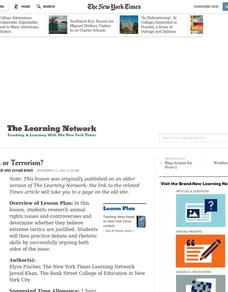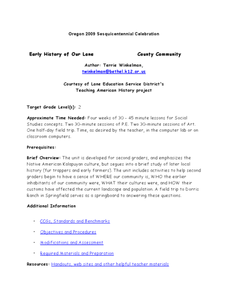Curated OER
Kid-Created Biographies
Students create biographies on the people they know best-- their teachers! students use various skills to collect information, organize details, publish the biographies and present the information.
Curated OER
Our Robots, Ourselves
Students imagine how they might use a robot in their daily lives, explore advancements in artificial intelligence, investigate robotic technology under development, and prepare posters that show how robotic technology might be...
Curated OER
Ambassadors or Annoyances?
In this lesson, students learn about the need for behavior standards for American college students in foreign study programs; they then create an introductory guide to the cultural values and customs of their own region for students...
Curated OER
Making the Future Present
Students draw and describe a new system for prison surveillance. After reading an article, they discover the use of a wearable computer by prison guards. In groups, they develop a proposal for a new type of technology to be used in a...
Curated OER
Dr. Seuss For a Day
Second graders brainstorm words to describe Thing One and Thing Two characters from Dr. Seuss computer program, use variety of adjectives to create descriptions, and create new set of characters, Thing Three and Thing Four, by drawing...
Curated OER
Combien co¿¿te?
Students engage in conversation using the target vocabulary and grammar structure while discussing prices in euro. They also engage in listening and writing skills related to these topics. Finally, students identify and analyze the...
Curated OER
Imagery: Symbolic/realistic
Students recognize and use the visual arts as a form of communication. They use the computer as a visual arts tool to gather images for a story they are telling. They discuss related stories that differ in their realistic images. They...
Curated OER
Environmental Harmony
Learners use information from a variety of media to evaluate different artists' views on the human relationship to nature. From these sources, class discussion, and personal experience, students will synthesize a thoughtful,...
Curated OER
Activism of Terrorism
Young scholars research animal rights issues and controversies and determine whether they believe extreme tactics are justified. They practice debate and rhetoric skills by successfully arguing both sides of the issue.
Curated OER
Special Treatment
Students determine the role of the FDA in approving new drugs. They investigate some of these new drugs and consider the pros and cons of taking part in a clinical study.
Curated OER
Battling Memories
Young scholars examine the wartime killing of civilians in Vietnam through discussion, close reading and research.
Curated OER
The Cream of the Crop
Students read and discuss article, "Simple Method Found to Vastly Increase Crop Yields," then research the basic components of conventional and organic agricultural methods. They, in groups, organize and present their research to the class.
Curated OER
Unlikely Communicators: Carrier Pigeons
Second graders explore information about carrier pigeons and other means of communication. They describe different types of communication and transportation and identify their advantages and disadvantages They develop a Communication...
Curated OER
In Whom Do We Trust?
Learners articulate their understanding of the framers' intentions with respect to the separation of church and state, explore the issue of church/state separation and how it is currently manifesting itself in Ohio by reading and...
Curated OER
Check Mate
Students share opinions about the goals and strategies of the games they play. They investigate the World Chess Championship by reading and discussion the article "In Major League of Chess, Next Year Comes So Soon." Students study the...
Curated OER
The Roots of Religion: Teacher’s Guide
Students explore ancient cultures. In this ancient religions instructional activity, students study the civilizations of ancient Mesopotamia they watch "Garden of Eden" and discuss their impressions. Students then research...
Curated OER
Early History of Our Lane
Second graders study Native American Kalapuya culture. In this American History lesson, 2nd graders discover the early inhabitants of their community. They take a field trip to Dorris Ranch.
Curated OER
African Artist El Anatsui as a Reflection of African Culture: Human Rights Issues and Activism Through Art
Students explore global issues through visual art analysis. For this African art lesson, students examine works by El Anatsui and discussing their human rights themes. Students then design lesson plans based on their findings.
Curated OER
Survivors on the Ocean Ridge
Students discover the uniqueness of deep sea hydrothermal vent organisms through an exploration of the NOAA Galapagos Rift Expedition. They study the genetics and evolution of a shrimp species that lives near the vents then they...
Curated OER
Journey to the Unknown
Students explore the ocean depths. In this scenario based lesson, students pretend they are on a submarine in an unknown part of the ocean. By using clues the class discusses and determines where they are in the ocean. They follow up...
Curated OER
Where the Spirit Moves You
Students explore the spiritual significance of locations throughout the world. After studying the historical and mystical importance of these places, students write about a spiritual place that is special to them.
Curated OER
Telling Time Timeline
Use the Internet and library resources to compose a telling time timeline -- a visual history of time. Students will develop research skills and gain perspective about telling time by discovering the history of clocks and time.
Curated OER
Jingles All the Way
Students explore various tactics used in advertising by studying the advertising campaigns of well-known companies. They earn about methods of political advertising in China by reading and discussing Political Power Grows From the Point...
Curated OER
A Community Responds
Young scholars explore the recent case of police brutality in Inglewood, California. By exploring the case in detail and discussing possible responses, students examine how such events can be transformed into learning experiences.























